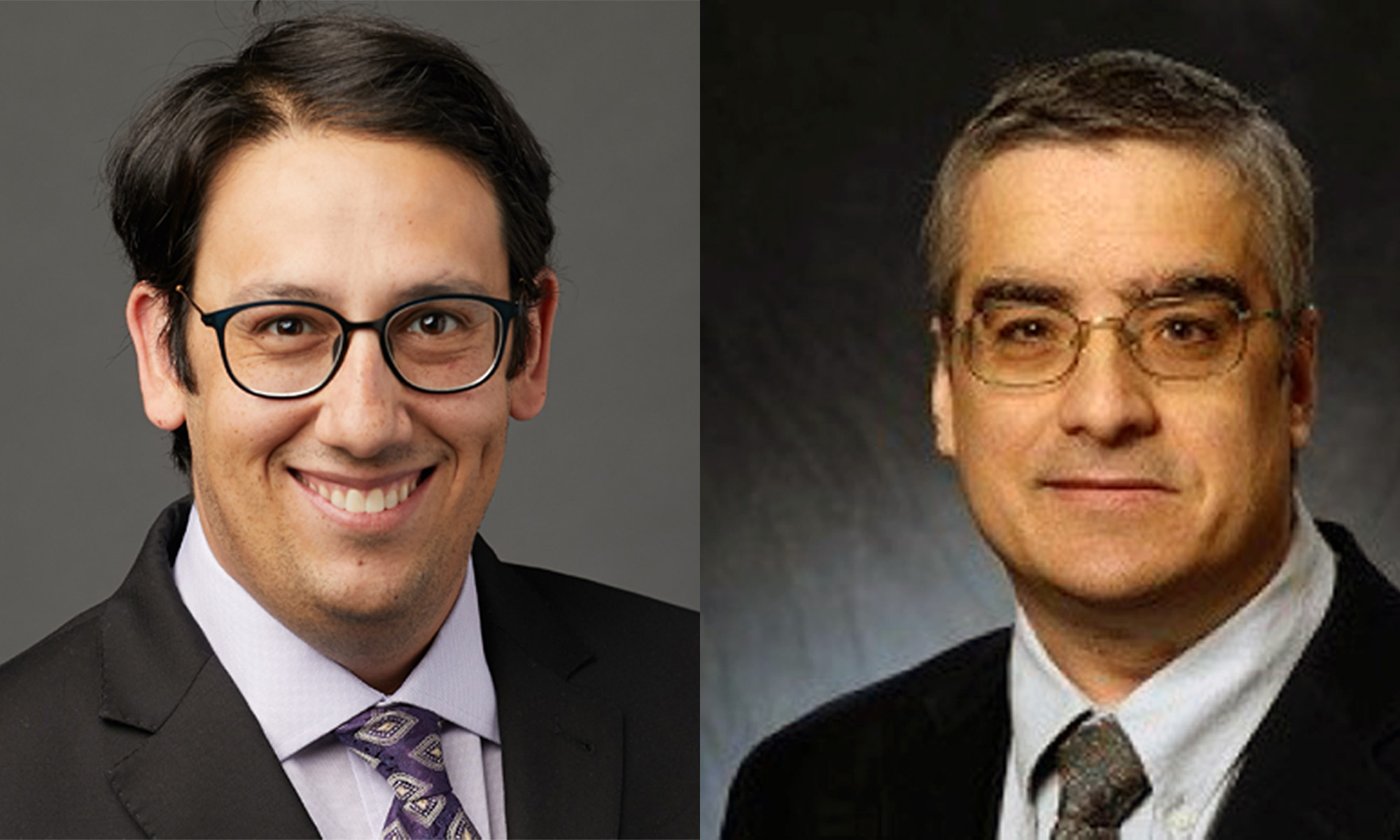
 Jeremie Lever, M.D./Ph.D. student and James George, Ph.D.James George, Ph.D., professor in the Division of Cardiothoracic Surgery for the Department of Surgery, is the latest winner of the School of Medicine’s Featured Discovery. This initiative celebrates important research from School of Medicine faculty members. Dr. George collaborated with Anupam Agarwal, M.D., director of the Division of Nephrology and executive vice dean for the School of Medicine, as well as Jeremie Lever and Travis Hull, who were both M.D./Ph.D. students during the time of the research.
Jeremie Lever, M.D./Ph.D. student and James George, Ph.D.James George, Ph.D., professor in the Division of Cardiothoracic Surgery for the Department of Surgery, is the latest winner of the School of Medicine’s Featured Discovery. This initiative celebrates important research from School of Medicine faculty members. Dr. George collaborated with Anupam Agarwal, M.D., director of the Division of Nephrology and executive vice dean for the School of Medicine, as well as Jeremie Lever and Travis Hull, who were both M.D./Ph.D. students during the time of the research.
The team discovered that, during acute kidney injury (AKI) in a mouse model, the kidney-resident macrophages are reprogrammed to a developmental state, resembling these same cells when they are found in newborn mice. During development in the womb, immune cells called macrophages go to the kidneys, and they remain there for life. Understanding the possible healing role for these macrophages after kidney damage is crucial to helping treat patients who suffer acute kidney injury.
This knowledge, published in JCI Insight, is important to promote healing and tissue regeneration. If a similar developmental shift is seen for human kidney-resident macrophages during AKI, that could aid new therapeutic approaches for patients. Read more from UAB News here.
The School of Medicine communications staff sat down with Dr. George to gain insights about his research, UAB, and the science community.
Q: What compelled you to pursue this research?
The focus of our research is on acute kidney injury particularly in critically ill patients, which is an intractable clinical problem with few treatment options. Acute kidney injury causes a great deal of morbidity and mortality at our medical center and across the world. Our central goal is to develop means to prevent acute kidney injury or to ameliorate it after it has occurred.
Q: What was your most unexpected finding?
We found a developmental switch among macrophages in mouse kidneys between the ages of one to three weeks, which is characterized by upregulation of a surface protein called MHCII (major histocompatibility complex class II), which is important in the regulation of adaptive immunity. By 28 days of age, nearly all kidney resident macrophages express MHCII. But after injury, we found that a large proportion of these cells downregulate MHCII like the cells found in embryonic and neonatal mice. This led us to suspect that such cells recapitulate a developmental program, connecting the injury response in kidney immune cells to renal organogenesis.
Q: How do you feel your research will impact the science community?
The significance of different macrophage subpopulations that reside in the kidney is only now becoming apparent as we uncover their functional significance in kidney disease. This research shows that macrophages are involved in dynamic regulation of kidney microenvironments throughout kidney development, during homeostasis, and after injury.
Q: What is your research’s relevance to human disease (if applicable)?
The prediction, diagnosis, and treatment of acute kidney injury is in dire need of new approaches. There is increasing evidence that macrophages that reside in the kidney are a key component in injury and subsequent recovery from injury. Our research shows that macrophages may participate in building the kidney during development and that some of these same cells may participate in rebuilding the kidney after injury.
Q: How has being at UAB and living in Birmingham affected your research?
The collaborative and collegial environment among faculty at UAB has greatly fostered this work. The study was a team effort which resulted from collaboration among four departments at the School of Medicine and three core laboratories. Training programs at UAB are very popular among students and fellows. These grads and postgrads describe Birmingham as being convenient to live in and to focus on biomedical science and home life. Our trainees have described the drive toward high quality and impactful science, while still focusing on trainee development, as being a major factor in their enthusiasm, drive, and continuing decision to train here.